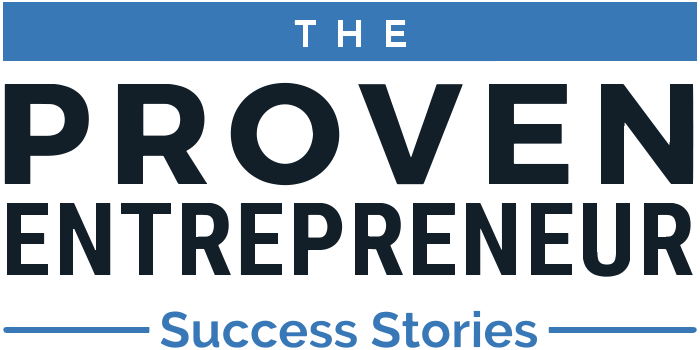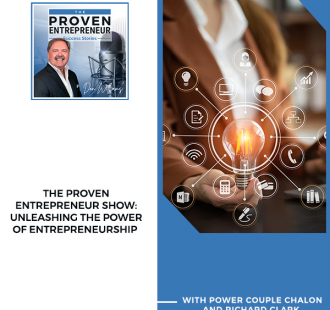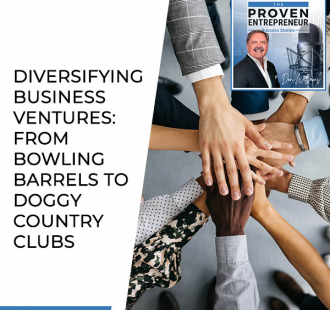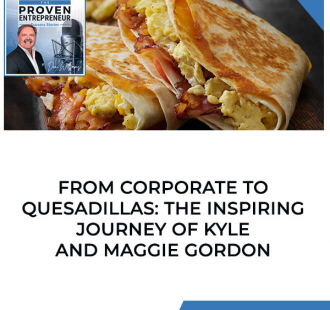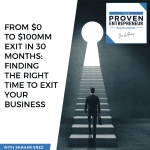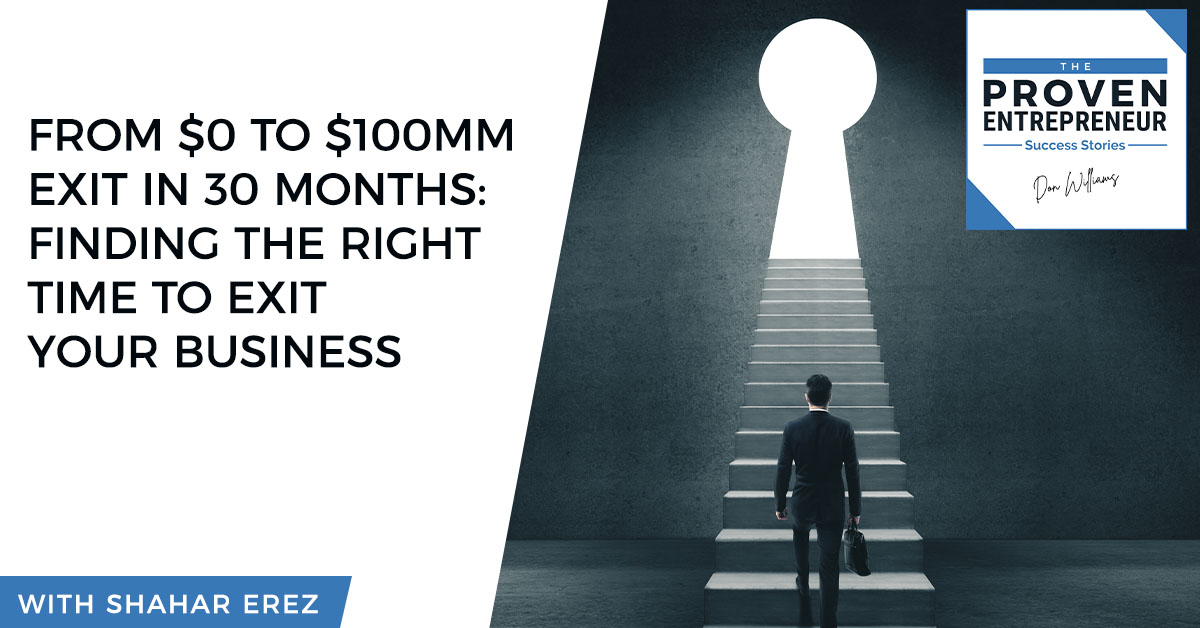
Exiting your business is like owning stock. You need to know when you have a very good return. So you should be able to exit without question. Building a company can be emotional, no doubt about that. You’re sacrificing your time, sweat, and tears into something that may or may not even work. But you have to remember that at the end of the day, your company is a business.
Join Don Williams as he talks to Shahar Erez about his $0 to a $100MM exit in 30 Months. Shahar is the co-founder and CEO of Stoke Talent. Stoke helps empowers organizations with a solution to manage their growing workforce. With the ever-growing rate of freelancers, Shahar is here to help.
Listen in as Don and Shahar talk about the freelancing landscape, especially in today’s environment. Discover how he sold his company with a $100MM exit. And find out why you need to network and go to meetings as an entrepreneur.
For information on how to work with Don visit Work With Don Williams
You can also reach out to Don Williams at https://donwilliamsglobal.com
Please join Don and his businesses in support of St. Jude’s Children Research Hospital in its Mission to cure Childhood Cancers. You can donate to St. Jude at stjude.org/donate
—
Watch the episode here
Listen to the podcast here
From $0 To $100MM Exit In 30 Months: Finding The Right Time To Exit Your Business With Shahar Erez
We have a phenomenal guest for you in this episode. We have Shahar Erez all the way from Tel Aviv, Israel. He’s going to tell us about a huge exit that he had in a relatively short period of time in a startup. Shahar, welcome to the show.
Thanks for having me, Don. It’s great to be here.
Thank you so much for coming in. Let’s go all the way back to young Shahar. Schoolboy, age 5 to 18, the household that you were raised in, whether that was with mom or dad or both or however that works, it’s different for different people. Was an adult entrepreneurial? Did someone set an entrepreneurial example for you in your home?
Absolutely not. My dad was a military person. Growing up in Israel, I saw my dad every other weekend. Back then, in the mid-‘70s, mid-‘80s, he used to come back every other weekend, I think. He spent most of his time after he left the military in public service as well in the Ministry of Defense over public transportation or whatever. My grandfather, my father’s father, was a Holocaust survivor. I was a social Democrat on the verge of a Communist, I would say.
I was raised in a home where my father told me, early teens, it’s like, “I don’t care about money. I never cared about money. All I care about is he’s doing something right.” That’s the home I grew up at. Money was an obscene word. I’m not an entrepreneurial home. When I was growing up, my ambition and it has to do something with where I grew up, was to be a military person myself. I want to be an Air Force fighter pilot or do something in the ministry of defense. I never thought about where I was going to find myself in. Not in tech and in entrepreneurship. That came a lot later.
There are so many, “accidental entrepreneurs,” but typically, it’s somebody who said yes to something and the next thing they knew, they had launched this entrepreneurial journey. We’re still in the young schoolboy stage. I was born and raised in Kansas and I had to mow the yard. Not because I got paid but because there were dire consequences if I didn’t mow it every week. A little different world than now. What was your first paying job? Maybe your first paying job was something entrepreneurial, but whatever it was, the first thing you did for compensation?
I worked at a stationery store. It’s like a small town Office Depot. It was a small store. Somehow my dad knew the guy there and he set me up for a summer job. I worked there selling stationery. That was my job.
How old were you?
It's never too late to go out on a new endeavor. There's no one recipe to success when it comes to building something new. Click To Tweet
I’d say before 14 or 15.
Leaving the schoolboy Shahar behind then to young man Shahar. After you graduated high school, you went to university, to the military and you backpacked across the Antarctic. What did you do?
I didn’t officially graduate high school when I was eighteen. I hated high school at that point. All I was waiting for was to get drafted. Everyone does. There are mentor and military services in Israel. I couldn’t wait to get an enlisted and do something. Back then, I thought it was going to be a lot more fun, which is servicing, shooting guns and flying planes. I spent almost five years in the service. I did a bunch of different things. I was an officer. Generally, it’s a three-year service. I ended up going through an officer’s course. I led a team in an officer’s course later on. I ended up staying for five full years. I didn’t go for posts of military service exploring Antarctica or South America or Southeast Asia like most of my friends did because, by the time I left the military, they were already back from their trips. I didn’t have a lot of people to go with.
They’ve done the three-year term. You did the five, so they were back by the time you buckled out?
There were already back. They did their SATs and they were all ready for college. When I finished my service, I went to get my high school diploma because, again, I didn’t take all my exams. Over the next months, I completed whatever I needed to complete. I started working at a company. It’s the condition or something of that sort. When I did my SATs, I got a pretty good score at my SATs. It set me up to get pretty much to any program I wanted back then.
Efi Arazi was one of the first entrepreneurs in Israel in the ‘70s. He set up the first tech company in Israel. The number one export out of Israel was oranges until he built the first tech company. That’s the momentum that we’re still seeing now. Efi Arazi announced that he’s going to give out scholarships to people with proven leadership. Entrepreneurial capability is extraordinary thinking. Something of that sort. I don’t remember the exact phrasing. It’s a full three-year scholarship.
I was like, “I don’t want to study computer science, but if I’m going to do it for free and got to get money to do that,” because he gave us, it was like $3,000, like a year of living expenses or something of that sort. I was like, “Sounds like a good deal. I’ll give it a try.” I remember I went to my dad. I’m going back to your previous question around an entrepreneurial home. I go, “I’m going to go for this thing.” My dad said, “You’re never going to get it. You don’t have a backpack. Don’t waste your time.” I sat down and filled it up. This is ‘97, ‘98, I think. I filled out all the paperwork. I was summoned to an interview. I got the full three-year scholarship to study Computer Science.
What did dad say?
It was the first time they recognized that I wasn’t that much of a wreck. There’s something that I might not be that much of a disaster. No, I’m kidding. My parents know I was a good kid and everything, but nothing much came out of me in high school. They tried to convince me back to stay in the service, by the way. It was like, “You never graduated high school. You got a career here. You got your health insurance, a future, stay.” No. By the way, that continued. We’re very judgmental of our parents. It’s part of what we do. They might have a lot to say about me as well. If you try to remember your parents’ background, I’m still judgemental day to day.

It’s like my father is a single child who grew up in a home. His parents were Holocaust survivors. It’s like the probability for him to make ends meet, find a way to make a living, don’t rock the boat too much. You can understand why they were scared. Whatever you have, keep it closed. Don’t take any chances. Every time, it continued after I left jobs and went for another job. They were like, “Why are you leaving? You’re worst.” When I quit my job and started a company, they were like, “Did they let you go?” No, I decided I wanted to do something else. Who does that? The momentum continued throughout my life. That’s how I got into computer science. I was an okay student. It wasn’t great.
My father was a United States Marine and so, military service. His wish was that I would become United States Marine. I could spit shined shoes at age five and I got my hair cut every Tuesday. I had no intention of joining the Marines. Interesting, though, he was not entrepreneurial in his 40s and I started my entrepreneurial journey at 26. After about a decade, he joined the party, started his own stuff, and has done well. That’s an encouragement to young entrepreneurs out there. If you haven’t, don’t worry if you missed the boat early. It doesn’t matter. You can start anywhere. Starting is probably the biggest step towards success, however you define that.
I think you’re right. By the way, what you’re saying is up for the young entrepreneurs. It’s for the older entrepreneurs. It’s never too late to go out on a new endeavor. I don’t think there’s one recipe to success when it comes to building something. There are a lot of young entrepreneurs who have succeeded and a lot of young entrepreneurs that failed. The same thing goes for the older entrepreneurs. By the way, there are some statistics that companies by entrepreneurs that started in their early 40s are likelihood of success is far greater than if you’re starting your companies in your 20s. The second thing is that we are in an era where very long careers are ahead of us.
When my father was in his twenties, Israel Military Service ended pretty much when you were 42 or 45. You go on retirement when you are 45. It’s like that part of your career is over, then you start a second career and that ends at 60 something. Now, people can work until they’re 80-85. There’s a lot of time. It wouldn’t surprise me if, over the next decade, we’ll start seeing entrepreneurs in their early 60s.
I’m very active with the entrepreneurial organization, which is global. There’s a chapter in Israel. I have friends there. It’s not common to find people in their 50s and 60s and certainly in their 40s. The interesting thing about that subset is that so many of them have Fortune 500 experience in the US. They have the knowledge and real experience of entrepreneurs like me, I was 26 and came out of selling. I knew how to bring in a lot of money, which that might be skill number one. There are an awful lot of other skills you need. Bringing in the money won’t get you there.
I agree. I know we’re jumping into a completely different topic, but one of the toughest things too when you’re starting a new company or any enterprise. The first 10 to 30 customers are the toughest to get. It’s like, how do you get someone to make a bet on you? There are no references. It never worked. There are going to be a lot of problems with your first ones. For people with a network with Fortune 500, getting the first 30 to 50 stalls is far easier and far faster than anyone else who still doesn’t have the network. That is such acceleration or accelerating effect. That plays such a significant role in increasing the probability of success. I know that worked well for us.
I agree with that. One of the things digital marketers preach is getting the first ten customers as fast as possible. Nothing is important until you get that done. Do not go to step 2, 3 or 4 until you complete step 1. I know that when I first started a common question. We sold a future service. You’re paying for it now and you’re going to get the service later. The common question was, “How do I know you’re going to be in business?” We’re a startup. Honesty is one of my core traits. I was born that way.
My answer was always, “It would help a lot if you bought from us,” and that makes no sense, but it’s so honest, it would shock people and they would buy. Honesty is sometimes in short supply in the world. If you’re brutally honest, people are like, “I like that.” They’ll roll the dice on you. They’ll give you a shot. Let’s talk about how many entrepreneurial ventures have you had?
There's immense power in the ability to make a decision. Click To Tweet
Generally speaking, I was more of an entrepreneur up until 2012, I’d say. I worked at Mercury Interactive, HP and VMware. In each of them, I started internally. I’d say initiatives. I raised internal funds, built teams, started new initiatives in spaces and built products that never existed before. My first real startup, fully standalone, was in 2012. I bootstrapped the company with Helicos, my cofounder now as well. We couldn’t raise funds in Israel. I was still in California when I started the initiative. I was ready to raise funds. I had a term sheet. We decided with the family that we were moving back to Tel Aviv.
Moved back to Tel Aviv, no one here on this or what I’m trying to build. We never raised funds, but I decided we’re bootstrapping. We bootstrap for a year. Not much came out of it at some point. Someone I knew at a company called Kenshoo offered me to join the company. We are getting ready for an IPO. They never needed IPO, but I did join them. That was my first company and the second company is Stoke.
The first company, was it not the outcome you desired?
Not financially. Not by building a reputation. None of that. There’s a ton of learnings that I came out of that experience. It was fun, the ability to build something, make fast decisions, work at such a small team, make decisions, and see things happen faster. It was the first time I had worked or operated in such a capacity and I enjoyed it. Coming out of my corporate background, working at corporate, it’s like you spend 30% executing and 70% handling internal politics. It’s part of the game.
No one likes it, but when you see what’s behind the curtain, there’s another way to do things. It’s very difficult to come back and go back to deal with the politics. From that aspect, I learned a ton from how do you start a company? What does it mean to you? Buy our domains, market it, build the right architecture, negotiate things, and have a ton of fun, but it wasn’t the outcome that I expected.
I share with my own clients. I was like, “You win or you learn. Learning is slower winning.” You don’t lose as long as you learn to help yourself in the future. Let’s talk about Stoke Talent. I think you have a platform where you provide on-demand, non-payroll or contractor resources. Is that correct?
Yes and no. The background for Stoke was in the company that didn’t succeed, the one I started in 2012 because we couldn’t afford employees, we bootstrap, started working with freelancers and it was early days for the online marketplaces for back then was oDesk and Fiverr. We started using freelancers and we’ll learn how to work with them.

Over the next months, I think we had about eighteen freelancers working for us from the United States to Bangladesh, Pakistan and India. Some of them worked with us for 2-3 days. Some of them worked for six months. Some of them spend hours with us. It depended on what we needed, but I found there’s immense power in the ability to make a decision. You need something executed and within 48-72 hours, you have something for someone starting to work on it.
The flexibility and seeing how people operate on-the-job qualification, if you will, was something I’ve never experienced before. When I had my term at Kenshoo, I decided I wanted to explore the same structure and started building more on that type of workforce. I started researching. I saw that all forecasts are for freelancers. The number of freelancers worldwide has been growing exponentially over the past two decades. Forecasts are for that number to reach 50% of the workforce to be freelancing by 2025, 60% by 2030. This is by DOL and IRS. The number of freelancers is growing worldwide. With that, most companies do not know or have any way or means on how to handle that type of workforce.
Most people that are growing within corporates are dealing with hiring full-time employees. We all hear about full-time employees. How do you hire full-time employees? A full day in place, all that challenges. If you think about 40% to 50% of your workforce, even if it’s 30% of your workforce, is going to be freelancers, how do you manage that? Managing freelance isn’t managing employees. When you manage employees, we’re managing headcount.
When you’re managing freelancers, you’re dealing with budget, invoices, legal documents, workforce classification, data, there are a lot of things that are different in managing freelancers compared to managing full-time employees. There’s been a spur of HR management platforms over the years like Workday, Bamboo, Hi Bob and all those to manage your full-time employees. Your freelancers and contractors should not be managing an HR platform because that calls out for an HR violation or workforce classification.
There are no systems to manage freelancers. Most companies are managing those and excel. We said, “We want to automate the process, onboarding payments, contracting taxation, tasks and so forth.” We built a platform to manage that. With that, to help you, source freelancers, as well. If you need freelancers, you can post a job on Stoke. We’re connected to multiple marketplaces and we’ll help you fill out that job.
If you think about it, only to give you an analogy, most of the online marketplaces, there are about a thousand marketplaces were built for a transactional business. You need someone to do your kid’s birthday video, go on Upwork, swipe your credit card and someone will do your kid’s birthday video. If you’re in corporate, you can’t swipe your credit card or anyone’s credit card. There’s a system where there’s budget, controls, compliance and that’s what we built Stoke for to fit that realm.
Any company out there, if they don’t have a freelance strategy in place, they will not be able to thrive. There’s a chance they won’t be able to survive. If you hear these numbers and that changes the workforce going through them, then COVID came and completely changed everything. Now, everyone’s working remotely, so the propensity to be a freelancer increased significantly.
You’re almost the poster child for work corporate. Learn, then go be an entrepreneur for HP, for example, or some major international business and start your entrepreneurial journey. We could almost take your picture and you’d be the poster child.
Building a company is emotional. But always remember to treat is as a business. Click To Tweet
I never planned for it. If anybody asked me, I probably wouldn’t recommend HP as a company to try and sharpen your skills. I had a good ride. More than the companies, I was super fortunate to work with super-talented individuals. My direct boss, the guy that managed Merck Randy, is on my board now. He’s a good friend. The guy who managed me is the CEO at Sumo Logic. I was fortunate to work for people who had that energy and sharp mind to constantly challenge existing truths and try to push forward.
It means that HP and those other companies had great eyes for leaders that would do a great job.
They acquired good companies.
Sometimes, the easiest way to grow is through acquisition. You can short circuit the whole process. Share a little bit with us about your exit.
I didn’t see this coming. When we started the company in 2019, I didn’t have Q1. We raised $4.5 million seed. We ran for about 7 or 8 months, then COVID started. For those who remember the first three to five months post the pandemic break outbreak. Everybody thought that the market was going to collapse. We’re hitting armageddon. All CFOs that I tried to have conversations with were like, “It’s not the right time. We’re doing refinancing. We need to recalculate our runaway.” It slowed down our go-to-market in 2019. We had the market in July and August of that year. In Q1 the following year, we did our A-round or Q2.
We raised $15 million led by Battery Ventures. We are ready to go storm and go build a bigger company. In the process, we talked to a lot of different VCs in the process of fundraising. One of my colleagues in the network is Fiverr’s CFO. He helped us along the way as we started, showing them some model. What’s the pricing model? How do we make out of freelancers all that? He was aware we were going to raise funds. In one of the conversations, he’s like, “We want to participate in the round. Do you mind making some room for us?” I said, “I’ll be honored. I’ll get to you. I’ll cut you in.”
I think I was able to make $300,000 or $500,000. It was a small portion that I was able to make available for them. They were like, “No. If we’re coming in, we’re coming in. We need to come into with a bigger check.” I was like, “I don’t have enough room for a bigger check in this round.” They ended up not investing, but in the process, we had conversations and I met Fiverr’s CEO a few times, Micha. It ended up not working out. We stayed friends and set our referrals well. It was around May or the June timeframe. A few weeks later, he called me up and said, “After we met you, we had conversations, internal conversations, and external conversations. We like the space. We think we might want to do anything. What do you think?”
I was like, “I think this space is interesting.” Nothing happened. He called me up in early August. I was here at home working from home and he’s like, “We’re interested in this space. What do you think about us buying you?” We’re Israelis. We’re blunt. I can’t say that I was blown away or didn’t see that coming because, after the previous calls, I was like, “This might happen.” I promised myself along the line. I don’t need to tell you this. Building a company is super emotional.

It’s your blood, sweat and tears. You sacrifice time with family. You potentially sacrifice your own future career. You don’t know what’s coming out. I promised myself when an offer would come or whatever, I’m going to treat this as a business because you get confused. You got to be, again, that’s my take, very cold. The point is you’re evaluating your options. In 2021, to take everybody back, selling a company for $110 was considered nothing but selling yourself cheap. It’s like everyone was a unicorn in 2021. If you’re not raising a billion-dollar valuation, it’s like, “What are you doing?” When we started the conversation, with far as like, “Am I selling or not?”
He said, “We want to buy you.” I said, “I raised $15 million in the back. I can run for two years. I’m not in a hurry to sell anything, but I promised myself that I’d treat it as a business. I think Fiverr is a great company. I would love to find a way to make it work.” End of conversation. Ofer was the CFO back then. He is still the CFO. Let’s leave commercials aside for a second. Let’s assume this happens. What does the day after look like? Let’s talk about how do we going to work together? Why are you guys interested? What do you want to do with us? What’s it going to be the org structure? Let’s work through it. That’s, for me, the complicated part. Commercials are almost black and white.
It’s either the numbers work or they don’t work. Let’s not argue the numbers because even if the numbers work, I don’t want to work with you. It’s not going to happen. Let’s work out the complicated part. We spent a couple of one-on-ones working through that. Once we’re aligned on the vision in the thought process, let’s talk numbers. We worked it out. They were a bit flexible. We’re a bit flexible. We found some middle ground there. The board didn’t want to sell. As I mentioned, the board invested. From an IRR perspective, it was phenomenal. Those who joined in the seed round were about almost 6X in two years. There was that joined in A-round, Iran did 2X in a quarter and a half, so it’s not bad numbers.
This was I was what I was told. It’s like, “Stay another round. It’s not that difficult to become a unicorn these days.” I was like, “The market’s insane.” The probability of the market’s staying in these multipliers, I don’t know how. I made the decision. I made the decision that it’s a great outcome to, first of all, the customers, the employees, the investors and personally for myself and my cofounder. Can it be better? Maybe.
It’s like owning a stock. It’s like, you need to know when you had a very good return. It was a great ride and there was a very good outcome for everybody involved. I’m super happy that we made this decision. Not that I had a crystal ball, if you see what’s happening in the public markets since. You understand that those 40, 50, and 60X multipliers are not sustainable.
I have a good friend that has a billion-dollar company. He’s fond of saying, “You’ll never go broke taking a profit.” It sounds pretty basic but so true.
You can get super emotional. People ask me, “Why didn’t you sell?” I try to trigger myself into conversation with myself. It sounds like a brilliant scene when I say it, but why not sell? The only reason I found not to sell was because I don’t have my face on the cover of Forbes or whatever other magazine for a billion-dollar company. I was like, “That’s ego.” I promised myself I’ll run it as a business. Getting from an idea on a PowerPoint sea drought to 110 million exits within 30 months isn’t bad.
That certainly qualifies at the top of the list of things that are not bad. $0 to $110 million in 30 months. Amazing. Thank you so much for sharing some detail there. I’m going to ask you a couple of questions here. Looking back in your career, whether it was military, corporate, your first company or this company, would you share a hard lesson? Something that happened that when it happened, you were like, “Ah,” but maybe in retrospect. Maybe looking backward now, it turned out it was for the positive, but at the time, it hurt.
Exiting a business is like owning stock. You need to know when you have a very good return. Click To Tweet
When I was at VMware, I knew my direct manager and I knew my indirect manager. Obviously, when you’re in corporate, you want to climb the corporate ladder. It’s like, you’re always wanting the next title or the next recognition or the next project. I was fighting for it. This is what I wanted. I kept talking and I kept saying my opinion. I kept fighting everyone because I wanted to be the smartest person in the room. You constantly want to prove yourself because you think every meeting is going to be detrimental to your performance review or whatnot. I was fortunate again to be managed by people who, in retrospect, cared and until you’re ruining it for yourself.
It’s like, you’re not ready. You’re not there yet. You don’t always have to speak your mind. I remember it’s cringing the moment. It’s like, “Did I sound stupid? Is that what they’re saying?” As a young, eager person, it’s like, “I have to speak my mind. I have to tell them they need to be better. I’ll show them the way.” In retrospect, I learned the lesson. I don’t know if it comes with age or does it come with experience, but you don’t always have to be the smartest person in the room. Spend a lot more time listening, giving a lot more room to others. You don’t constantly have to make others think the same way you do. You have to recognize that the entire world isn’t viewing the rest of the world through your own lenses.
Everyone has a different perspective and you have to accept it. I still remember those days as I was fighting. It’s like every morning, I came in for a fight. I came in to prove myself. It was like, “Here I am. Everybody, come in here and listen to what I have to say. You don’t know what you’re talking about. I’ll teach you how to do things.”
As you gain confidence, you’re a lot of body as a young leader. When you start fighting for your position, it means you’re in that position and it’s true. I had a hard time accepting. Now, I’m not bothered by the fact people like or don’t like what I say. I don’t expect to be the smartest person in the room. I don’t mind other people. I’m not looking for credit anymore. It’s like I don’t care about that but it’s a while. I don’t know if there’s a way to get that earlier in life.
I think some people never get it. Is it age? Is it experience? Yes, but some people never get it. In fact, there’s real value to being certain that you are not the smartest person in the room. You are surrounding yourself with people that are smarter. It’s interesting to me that humans are wrong at such a large percentage of the time. One thing I’ve learned is I want to explore the opposite of my initial thought that I may still like my initial thought, but it pays to explore the opposite because maybe that’s the way. Maybe that’s the path. You don’t know sometimes.
I like Jeff Bezos’ 2015, 2016 letter when he talked about decisions. It’s like 99% of decisions we take are reversible. I let people make those decisions. Worst case, it will revert. I’d rather move fast rather than slow down. There is no way back. It’s like going for an IPO. Once you go IPO, it’s like, there’s nobody going back. Most of the decisions are not that extreme. What you learn over time, it’s like, when you’re young, you’re debating everything. We need to have this color on the button. We need to have this logo and this size. We need the flow. Everything is like the company’s going to live or die based on this micro thing.
- A) I don’t know whether we should have it in this color or that color. Let’s do something, try it, learn and if we’re wrong, we were wrong. There is no data to back up one or the other decision. There’s a phrase when I did, again, I was in the officer’s course. I was the leader in the officer’s course and they taught you to train young officers that making an excellent decision has nothing to do with the decision’s outcome. You made a decision based on all the data that you had. It doesn’t mean that the outcome is going to be right or wrong. The outcome may still suck. Once you get that, it’s like, “This is the data I have based on this data. This is what I think we should do. Let’s move on.” Maybe the outcome is going to be different.
Don’t do the fatal mistakes. Make small mistakes and correct it. I want you to think back to the vault of living in your mind where you keep the golden nuggets of entrepreneurship, the things that are most valuable. Would you share one of your golden nuggets with us?

There’s a story. I never say no to a meeting. I never say no to an opportunity to meet or network with people. Entrepreneurs, CEOs, young CEOs think that they run the world. It’s like, “Don, we’re too busy for you.” By the way, I’m a human being like most people there. There are a few entrepreneurs that I interacted directly with in the last few years and I wanted to build some partnerships with them. They all blew me off. Not all of them but a few of them blew me off for the past few years. There were too busy to talk to me.
At least two of them have shut down their companies over the last months because they weren’t able to raise funds. There’s a little side in me that says, “F-you. You deserve this for behaving the way you did.” Not personally because of me. I think there’s a testimony. A) We’re brothers in arms. We’re all entrepreneurs. I’m not some goofy entrepreneur. I’m not here to ask you for money. There’s something interesting. Have the courtesy to take a call. Maybe nothing will come out. Not personally Shahar but a lot of other people.
For me, the story I have that had a significant effect on how I understand why what I’m doing and what I’m taking meaning to is so important. Back when we started the company, in the summer of 2019, the company was three months old and we had nothing. There’s a big conference that I wanted to speak at. It’s called ASU GSV. It’s like 5,000 attendees, future awards, future education and I was like, “How do you get like a main state session there?” It’s like, there’s no way back of my mind. Summer of 2019, I get an email from, again, someone that wanted to do a call with me. I took the call.
We spent 30 minutes. Nothing came out. A couple of months later, he sends me an email, “There’s a guy named Dan Summer. He’s in Israel. You might want to meet him.” I was like, “Why would I? I have no idea what this guy does.” I was like, “Sure, I’ll take the meeting.” I took a scooter to meet this guy in August in Tel Aviv.
It’s 110 degrees out there. I’m sweating like a hog. I’m getting to the place. The guy’s not there. I’m texting and he’s like, “I’m running late.” I was like, “I’ll wait.” Ten minutes later, I was like, “Are you coming?” He was like, “I’m still late.” I was like, “What the F? I’m an entrepreneur. I’m wasting my time here.” The guy shows up super nice. The guy sold this company for $750 million or something of that sort.
I was like, “Okay.” It gets interesting. I’m glad I waited fifteen minutes. We shoot the crap. At some point, he goes, “I understand there’s not much I can do for you. I understand you already raised money. It sounds like you know what you’re doing. I like what you’re doing. Is there anything I can help you with?” I was like, “No, I think I’m good. Thanks. I enjoyed the meeting. I’ll let you know when I’m in New York.” The moment before I walked out, I was like, “Dan, by the way, there’s a conference called ASU GSV. I’m trying to figure out how to get to know someone there.” He goes, “I know Deb Quazzo. She’s a friend. She runs ASU GSV. Let me run the intro. She’s going to love you.”
The guy made the intro to Deborah. I speak to Deborah. Two weeks later, I got two speaking slots on the next ASU GSV. That never happened because of COVID. That’s a different story, but that would never have happened if I hadn’t taken that meeting. Take the meetings. Make the time. Don’t waste your time with anybody, but if you’re spending time with other entrepreneurs that need your advice, they want to spend time.
I think there’s a positive circle that happens when you take these meetings. Make sure you network. Make sure you meet with others and take the heart. Don’t go to those who are telling you have a great idea. Go to those who challenge you and tell you that you don’t have your crap together. They’re the ones that will make you better.
Making an excellent decision has nothing to do with the decision’s outcome. Click To Tweet
The second piece for our audience is to take the meeting and don’t be afraid to ask somebody what you want. I have met a dozen billionaires who have become great friends merely because I walked up and said, “My name is Don Williams. I like this, this and this. Could we do whatever?” It’s amazing how many times people say yes.
Last tough question. Let’s put you in a time machine, going to take you all the way back to twenty-year-old Shahar. You get about 60 seconds, maybe 90. You can share one piece of advice with your twenty-year-old self that would have a major journey easier, faster and better. Into the time machine, you go all the way back. Here’s your twenty-year-old self. What do you share?
Have more fun. Don’t do anything different, have more fun.
Sometimes, entrepreneurs, we’re so locked in our heads so, trying to hit the next goal, so trying to make the widget hit the thing of a jig. We forget life is short. Better enjoy it while you can.
I have a post that I wrote on LinkedIn. One of the things that I’m still not good enough at. There’s a lot that I’m not good enough but specifically for this stuff. It’s like, I don’t celebrate the wins well enough. I don’t know where it comes, the background, and the desire to constantly do something, even when we sold the company. There’s like a 48-hour window of, “Nice deal.” There’s a new goal to hit. We got to hit the numbers.
It’s like there’s always this next thing. There’s more than you think about when you read these phrases. If you want to be happy, it’s not about getting more. It’s about enjoying what you have. I know two types of entrepreneurs or those that celebrate vocally every small achievement and those that only complain about what we lost. I’m probably more on the second side, unfortunately. We need to balance it out. There’s good and bad. We need to celebrate the wins and we need to research where we failed. To my twenty-year-old self, have more fun, take more breaks and don’t do anything else different. Enjoy it.
Not dissimilar to me. I was the world’s worst about we hit this goal. Great, but what about this over here that’s not going so well? Not even celebrate it for a second. Before, I was looking for it, but this part over here is not good. With me, I don’t know if you know this. I’ll give a shameless plug. I began a daily gratitude practice years. I released a book, the number one new release on Amazon. Very grateful for that. People who practice gratitude daily are more grateful.
My wife had her 47th birthday.

That might’ve cost you jewelry to say that to our audience.
No. A) She’s not into jewelry and it’s fine. Part of growing up is acceptance. We can’t hide that fact. On her birthday, she said, “I’m listening to this professor say follow the three G rules. Goals, you always have a goal you’re going after. Giving, always be in a mode where you’re giving others and gratitude. Follow three Gs.
I enjoyed it. I reserve the right to recall the witness at a later date for a different topic or subject. You’ve been phenomenal, Shahar. Thank you so very much.
Don, thanks a lot for having me. I had a blast.
My pleasure. Folks, that’s the episode. See you next time. Thanks.
Important Links
- Shahar Erez – LinkedIn
- Stoke
About Shahar Erez
 Innovation is a term rarely applied to the way we hire talent. Leonardo de Vinci created the first professional resume in 1482 and not a whole lot has changed since.
Innovation is a term rarely applied to the way we hire talent. Leonardo de Vinci created the first professional resume in 1482 and not a whole lot has changed since.
But the world has changed. Global digitalization has changed the way we live, changed the way we communicate and changed the way we work.
At Stoke Talent it’s our mission to ignite the future workforce and bring it in line with the world we live in today. To empower fast-scaling companies to rethink their traditional hiring and operating methods, and find a better way to grow.
After all, that’s what innovating is all about.
To discuss the future workforce, innovation in tech or our mutual love of cycling, email is best.
info@stoketalent.com
For information on how to work with Don visit Work With Don Williams
You can also reach out to Don Williams at https://donwilliamsglobal.com
Please join Don and his businesses in support of St. Jude’s Children Research Hospital in its Mission to cure Childhood Cancers. You can donate to St. Jude at stjude.org/donate
